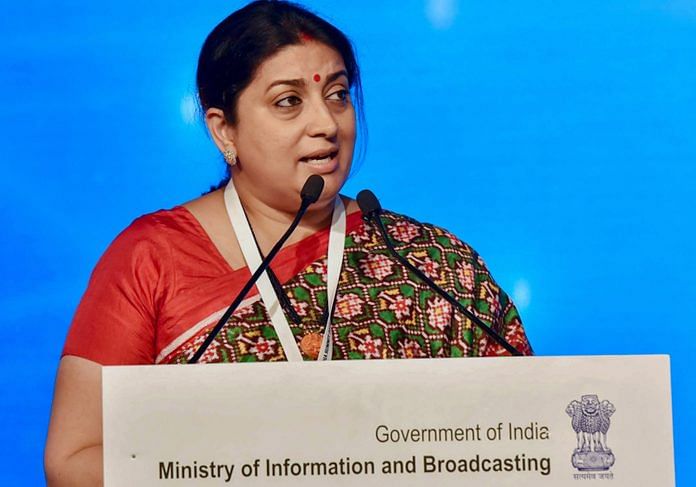The former actor was divested of I&B ministry Monday, just ahead of the 2019 elections. She had earlier lost the HRD ministry.
New Delhi: The biggest casualty of Monday’s Cabinet reshuffle, possibly the Modi government’s final one before 2019, was Smriti Irani.
For the second time in her ministerial career, Irani has been divested of an important portfolio following a controversial stint at its helm. Her exit this week as information & broadcasting minister comes less than two years after her replacement as the human resource development minister.
Considered to be one of Modi’s key Cabinet ministers, Irani has also been among the most controversial. The decision to take away the key ministry from Irani — which comes just ahead of the general election, when I&B has a crucial role to play — is learnt to have been in the offing.
Under lens from the start
The appointment of Irani, a former TV actor, as I&B minister in July last year had raised several questions over potential conflict of interest.
Her decision to reportedly help out old pal Ekta Kapoor of Balaji Telefilms was suspected to have cost Doordarshan crores, while another contentious decision saw her engage a private firm, SOL Productions, for the live coverage of the IFFI opening and closing ceremonies despite DD’s prowess. She is also accused of putting on hold DD Free Dish auctions, a source of revenue, at the behest of certain private broadcasters.
Her decision to initiate a massive transfer drive among Indian Information Service (IIS) officers across the country soon after taking over drew flak.
The exercise was pegged as a rejig for the Press Information Bureau, the Centre’s nodal body for official communication, to strengthen regional outreach. It was started in November, and, by February, over 150 officers had been transferred after an “interview” with her and I&B secretary N.K. Sinha.
Some of the officers transferred were as less as three months away from superannuation, reportedly without a thought to the role they could play at their new postings.
As a result, the entire media unit was caught in panic and confusion for several months during the final year of the current government, when it is supposed to be working at its best capacity.
In a letter to the Prime Minister’s Office (PMO), IIS Group A Officers’ Association president Anindya Sengupta said the transfer orders had affected a fourth of the cadre and followed no policies or guidelines. Sengupta, a director at Doordarshan News at the time, was subsequently transferred to the ministry’s publications division.
‘Against press freedom’
As I&B minister, Irani also carved an image of herself as someone hostile to the idea of a free press.
A press statement threatening journalists with the cancellation of government accreditation for spreading ‘fake news’ — when an official definition of the scourge is yet to be laid out — was hurriedly ordered revoked by the PMO after widespread condemnation.
The I&B ministry’s proposal to issue RFID-enabled accreditation cards to journalists, an alleged bid to track them, and her move to regulate online media, effectively the domain of the ministry of electronics and information technology, didn’t help her image.
While it is a fact that Prasar Bharati has never been entirely autonomous, thanks to the funding it receives from the I&B ministry, the tussle between the two blew up under Irani.
Whether it was the ministry’s appointment of two high-profile journalists to key positions in DD and All India Radio at exorbitant salaries, or the appointment of a serving bureaucrat as member (personnel) at the public broadcaster in violation of rules, the row between Irani and Prasar Bharati chairman A. Surya Prakash triggered heavy drama as all the ministry’s suggestions were systematically rejected by the Prasar Bharati board.
‘Mismanagement on her watch’
Two high-profile controversies kicked up by the ministry’s alleged mismanagement of key events, the National Film Awards and the Asia Media Summit, portrayed India in poor light.
The President’s incapacity to hand out awards to all the National Film Award winners owing to a paucity of time had been conveyed to the ministry well in advance. The awardees were, however, only informed by the ministry at the last minute, leading over 45 winners to boycott the ceremony.
Even at the recently concluded Asia Media Summit, co-hosted by the I&B ministry, Pakistani poet Faiz Ahmed Faiz’s daughter Moneeza Hashmi was denied permission to attend an event, co-hosted by the I&B ministry, despite being an invitee. The ministry is yet to comment on this episode.
Amid all the drama, actual work of the ministry has suffered. Important legislation, such as the draft Cinematograph Bill (which seeks, among other things, more certification categories instead of film cuts), and the Registration of Newspapers and Publications Bill, 2017 (to crack down on paid news), has gathered dust under Irani.



